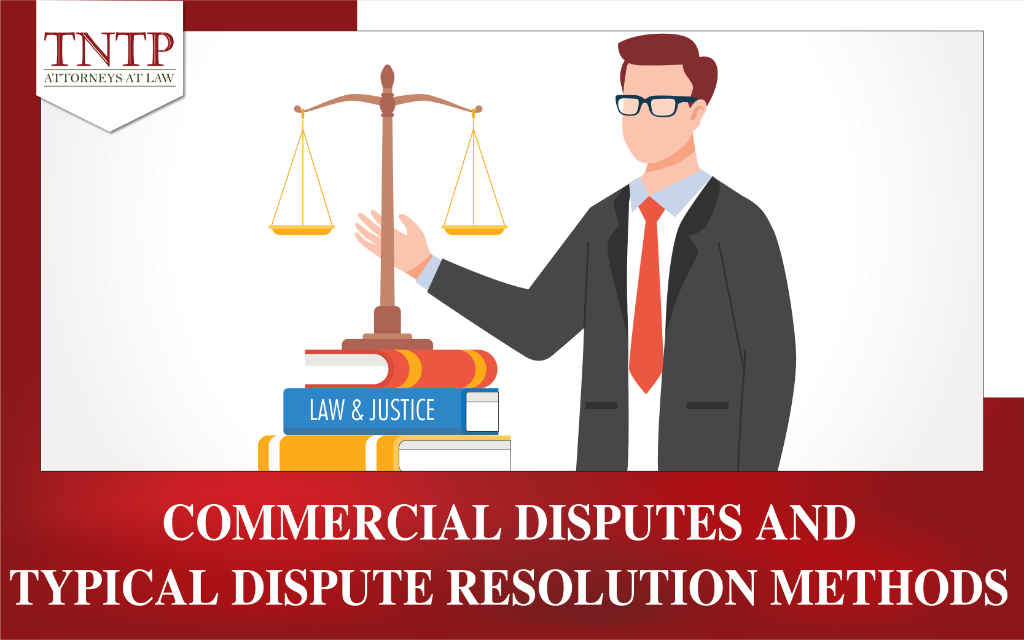Commercial disputes and typical dispute resolution methods

Commercial dispute is a common and frequent phenomenon that takes place in the market economy. Due to its regular nature as well as its consequences for the parties to the dispute in particular and to the economy in general, Vietnamese law soon had certain concerns about this activity expressed through specific regulations about the dispute settlement methods for this kind of dispute. In the following article, TNTP will give an overview of commercial disputes and typical dispute resolution methods.
I. Overview of Commercial Disputes
Commercial disputes are conflicts (disagreements or conflicts) of rights and obligations between parties in the process of performing commercial contracts. Derived from the above definition, trade disputes are characterized by:
● First, commercial disputes are conflicts (disagreements or conflicts) about rights and obligations between parties in a particular relationship.
● Second, conflicts (disagreements or conflicts) of rights and obligations between the parties must arise from commercial activities.
● Third, trade disputes are mainly disputes between traders.
II. Commercial dispute settlement methods
Currently, commercial disputes are resolved by the following methods: negotiation, mediation, court and commercial arbitration. Each method has differences in legal nature, procedure, and order of conduct. The parties have the right to choose the appropriate method, depending on the advantages that each method can bring, the degree of suitability of the method compared to the content, nature of the dispute and the goodwill of the parties.
● Negotiation
✔ Negotiation is understood as a method of dispute settlement through the parties voluntarily discussing, agreeing, self-mediating, and resolving disagreements to settle disputes without the assistance or judgment of any third party.
✔ The negotiation process between the parties is not bound by the law on the order and procedures for settlement.
✔ The result of negotiation completely depends on the voluntariness of each party to the dispute without any legal mechanism to ensure the enforcement of the agreement of the parties during the negotiation process.
● Mediation
✔ Commercial mediation is a method of settling commercial disputes agreed upon by the parties and supported by a commercial mediator to assist in settling disputes according to regulations.
✔ According to the provisions of Article 6 of Decree 22/2017/ND-CP, disputes shall be settled by commercial mediation if the parties have a mediation agreement. The parties may agree to settle the dispute by mediation before, after the dispute arises or at any time during the dispute settlement process.
● Court
✔ Settlement of commercial disputes at the Court is a method of settling commercial disputes at the adjudicating agency in the name of state power implemented by the court according to strict order and procedures. The effective judgments of the Court are enforced by the power of the State.
✔ The Court can only accept business and commercial disputes under the jurisdiction of the Court, specified in Article 30 of the Civil Procedure Code 2015.
✔ Settlement of commercial disputes by the Court is carried out through a two-level trial model: first instance and appellate level. The judgment of the Court may be appealed or reivewed according to regulations.
● Commercial Arbitration
✔ Commercial arbitration is a non-governmental jurisdictional method of resolution through the activities of an arbitrator as an independent third party to settle conflicts by issuing an arbitral award that the parties must implement.
✔ The parties’ request for dispute settlement must be recognized by an arbitration agreement, an arbitration agreement may be drawn up before or after the dispute has arisen.
✔ The disputing parties may agree on choosing the Arbitration Center, the Arbitrator, the place of settlement or the applicable law,…
✔ The arbitral award is final and takes effect from the date of issuance without appeal.
✔ Arbitration is a separate dispute resolution mechanism. Confidentiality is evident in the fact that the content of the dispute and the identity of the parties are kept private, meeting the need for trust in commercial relations.
Above is TNTP’s article on “Commercial disputes and typical dispute resolution methods”. We hope this article was useful to you.
Respect.


